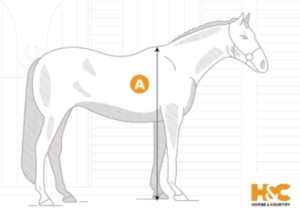Given no weapons, would you rather fight 100 duck sized horses or 1 horse sized duck? No doubt this would never be a real-life situation one would encounter, but it can still be fun to ponder. Both sides have their strengths and weaknesses, so let’s see which option would give you the best outcome!
Just like humans, ducks and horses display variety within the species. Not only are there many different species of ducks and breeds of horses, but there can be big differences between the females and males of the same kind of animal.
Smallest Ducks
| Height (inches) | Weight (pounds) | |
| Females | 8-9 | 0.9-1.6 |
| Males | 9-10 | 1.1-2 |
Largest Ducks
| Height (inches) | Weight (pounds) | |
| Females | 15-18 | 5-7 |
| Males | 20-26 | 10-15 |
Smallest Horses
| Height (inches) | Weight (pounds) | |
| Females | 27-31 | 56-90 |
| Males | 28-32 | 70-100 |
Largest Horses
| Height (inches) | Weight (pounds) | |
| Females | 64-68 | 1400-2000 |
| Males | 70-76 | 1800-2400 |
(Horse heights are always determined from the floor up to the withers, the highest point of the horse’s back. Image below is for reference.)

Since the differences can be quite substantial, it would be most reasonable to look at the most average or most common type of duck and horse. The mallard duck is a typical duck one would think of, and it is also the most common duck in North America. In North America, the most common horse breed would be the American Quarter Horse.
Mallard Duck
| Height (inches) | Weight (pounds) | |
| Females | 14-15 | 2-2.5 |
| Males | 15-16 | 2.3-3.5 |
American Quarter Horse
| Height (inches) | Weight (pounds) | |
| Females | 56-63 | 900-1100 |
| Males | 59-64 | 1000-1200 |
After determining the exact type of duck or horse you’d be facing, we can biw delve deeper into the characteristics of each that would impact the fight.
Swimming
Normally, mallard ducks swim at a leisurely pace of 2-6 mph, but they can swim at speeds up to 20 mph for a short distance. Horses are slower, normally swimming at around 1-2 mph and maybe up to 3 mph if in a hurry. A human with no training also swims at 1-2 mph, but competitive swimmers can reach speeds up to 5 mph for short bursts. Ducks are naturally buoyant due to oil-coated feathers, light bones, and also internal air sacs. Therefore, they can stay on the water for hours at a time. Horses can’t really float in place and will probably drown after 20-30 minutes. Humans could last for a few mere minutes to a few hours before drowning.
Walking & Running
For short distances on land, mallard ducks would be the slowest; they’d walk or run at around 5-7 mph. Humans walk at around 2.5-4 mph and run at around 5.5-8 mph. American Quarter Horses walk at around 4 mph and can run up to 55 mph. Although they are very fast, their endurance is relatively short. Their top speed covers only about a quarter of a mile, though they can travel 20-30 miles per day. Depending on the human and the terrain, humans could walk 15-30 miles per day. Ducks, however, have poor land endurance. While not much research has been done on this specific topic, mallard ducks could probably walk up to 5 miles a day. Needless to say, the duck would be at a huge disadvantage on land.
Flying
However, mallard ducks can fly, while humans and horses cannot. Mallard ducks cruise in flight at around 30 mph and can go in short bursts up to 70 mph. They also have excellent stamina and can fly for eight hours. Given adequate conditions to take off, the duck could stay in the sky for hours, leaving you no way of reaching the duck.
Vision
With eyes on opposite sides of their head, mallard ducks are able to have a full 360 degree horizontal view of the world, with the exception of a tiny blind spot right behind their head. However, their depth perception is quite weak. Unless the object is straight in front of them, their depth perception would be pretty terrible, which would be detrimental in a fight. However, the duck’s eyes can move independently and they are able to catch movement very quickly, allowing for them to escape possible threats. They can also clearly see objects at a distance two to three times a human could. In addition, these ducks also have a fourth cone in their eyes, allowing them to see a broader range of light than humans, which would allow them to perceive more vivid colors and thus be more sensitive to changes in their surroundings. Ducks are also active during dawn and dusk, so they’ve adapted better low-light vision than humans. Since their rods (detect brightness) are more densely packed, they are more sensitive to low light; combined with their UV vision, a duck generally has better vision than a human.
Horses also have eyes on opposite sides of their head, nearly allowing for full 360 degree vision. Their two blind spots are the area right in front of their head and the area right behind their body. Horses have weaker depth perception than humans, but they can also move their head, allowing them to gain better depth perception. However, their vision acuity is not as good as humans; they’d have to stand closer to an object than a human would to be able to see it clearly. Horses only have two cones and can only see variations of blue and yellow, which probably wouldn’t impact the fight much. Horses also have much better night vision than humans due to their increased number of rods, bigger pupils, and a reflective layer that increases light capture. Similarly to ducks, horses can see decently well in low-light, at least better than humans can.
Hearing
The American Quarter Horse is generally assumed to have hearing capabilities similar to that of the average equine, meaning that its hearing abilities are average for a horse. However, average for a horse doesn’t mean it’s on the same level as a human’s hearing. Horses hear from a range of 55 to 33,500 Hz, while humans hear from a range of 20 to 20,000 Hz. While they are able to detect more high-pitched sounds, it probably wouldn’t be useful in this fight. Horses are also much more sensitive to sounds, maybe as much as 10 times more sensitive, leading to “spooking,” a horse reacting to something humans perceive as low-volume. Horse ears can also rotate around 180 degrees, allowing them to pinpoint the direction of a sound without moving their body; an ability humans don’t have. In ideal conditions, horses can also hear sounds up to 2.5 miles away, given the sound is ~68 decibels (volume of normal conversation). However, in real life, conditions are far from ideal, so realistically the horse could hear up to 2 miles away.
The mallard duck has a hearing range of around 250 Hz to 6,000 Hz. Not only is their range more limited than humans, but ducks are also not as sensitive to sounds as humans. They also are not as accurate as humans when detecting the origin of sounds. In ideal conditions, a duck would be able to hear something at ~68 decibels from 1-2 miles away. Again, real life creates non-ideal conditions, so the duck could realistically hear from up to 1.2 miles away.
Setting
In any type of fight, the setting is a crucial factor in the outcome. Does the environment have a body of water? Is it shallow or deep? Is it running water or still water? Is it saltwater or freshwater? How warm is the water? If there’s no water, is the terrain smooth or rocky? Is the terrain empty (like grasslands) or dense (like a jungle)? Is the fight in nature or in an enclosed space? What’s the weather like if the fight’s outside? Is it daytime, nighttime, or dawn or dusk? How large is the enclosed space if the fight’s inside? What temperature would the air be?
Even as a strong swimmer, you wouldn’t be able to outswim a duck. Ducks are naturally built for the water and humans are not. But the horses? They are also not built for the water, so choosing the horses would give you more equal footing.
If you had to fight the horse sized duck in a deep body of still water, you are probably not making it out alive. You could tire yourself out and drown before the fight actually starts. While ducks can also drown, I would not advise you to depend on a drowning duck to win this fight. But with horses in a deep body of water, you stand a better chance of survival, even though horses naturally float better than humans do.
If there was a more shallow body of still water, if someone could actually stand in the water, then they stand a better chance of survival. However, moving around in shallow water can be arduous and slow. The duck could still float and attack with ease, though maybe your defensive maneuvers could be more effective.
If it was running water, you could drown much more easily. The duck would be fine, the horses would struggle, and the humans would also struggle. Therefore, fighting the horses would be easier.
In saltwater, everything has a high buoyancy, so it may be easier to not drown. However, accidentally swallowing saltwater would dehydrate someone much easier than accidentally swallowing freshwater. But it is much more likely for humans and horses to accidentally swallow water than ducks. In addition, saltwater can be much more painful to open wounds than freshwater, providing a layer of distraction. But the ducks wouldn’t be as affected by saltwater as much as humans and horses. Freshwater would provide more equal grounds for the opponents to stand on.
Depending on the duck species, ducks can swim in waters at around 20 degrees Fahrenheit and can also spend decent amounts of time standing or walking on ice. Horses have much less tolerance and generally would not swim in waters colder than 50 degrees Fahrenheit. Humans have even less tolerance; it is advised to wear thermal protection for temperatures below 70 degrees Fahrenheit; cold shock even from water at 50-60 degrees Fahrenheit could cause drowning. Clearly, the colder the water the greater advantage the duck would have.
If the environment had no aquatic elements, the duck would be at a disadvantage. They aren’t built to be fast, agile, or elegant on land. Horses and humans are terrestrial animals, so they’d have the same advantages. If the terrain was rocky, it would depend on the horse and the person regarding who would have an advantage. Some people just have more agility and more experience on rocky terrain, so they’d fare better than others. Some horse breeds live in mountainous regions, some live in open fields. Depending on the horse, rocky terrain would provide various levels of difficulty.
If the environment was dense (like a forest) instead of open, the horse-sized duck would find it very difficult to navigate. They already are not agile on land, so in this environment, the horse-sized duck would presumably be slower and less agile than a human, allowing for their offensive maneuvers to be ineffective. While the horses and humans may also encounter difficulties, the duck would be more strongly affected.
If the fight were in some sort of man-made enclosed space, the human may be less disoriented and confused than the duck or the horses, which may give them a short advantage in the very beginning of the fight. If the space was relatively small, then the duck would have an advantage because the human wouldn’t have anywhere to run from the duck, and the duck’s neck and wings would give it a larger reach. But in the same space, the horses would be disadvantaged because they would be squished against each other and probably find it difficult to move, allowing for you to go on the offense.
However, the duck-sized horses are not real and neither is the horse-sized duck. If there were hypothetically going to be creatures of such size, how would they act? Would each animal keep all its characteristics, only changing the size of the animal? But technically, wouldn’t changing the size of the animal also change its characteristics?
A horse eye’s large size allows it to see so well, so if it were sized-down, wouldn’t that mean its vision gets worse if it’s duck-sized? Would a duck even be able to stand if it were horse-sized? Could it still swim and float or would it sink?
Many questions are raised, none of which have answers, as this fight is purely hypothetical.
Final Option?
Honestly, whether you would win more easily in a fight against 100 duck sized horses or against 1 horse sized duck really depends. There are simply too many variables to account for that could have the potential to skew the fight in one side’s favor. In the end, it’s all up to personal preference: would you rather spend less effort on overcoming smaller challenges or put your effort into overcoming one large challenge?



